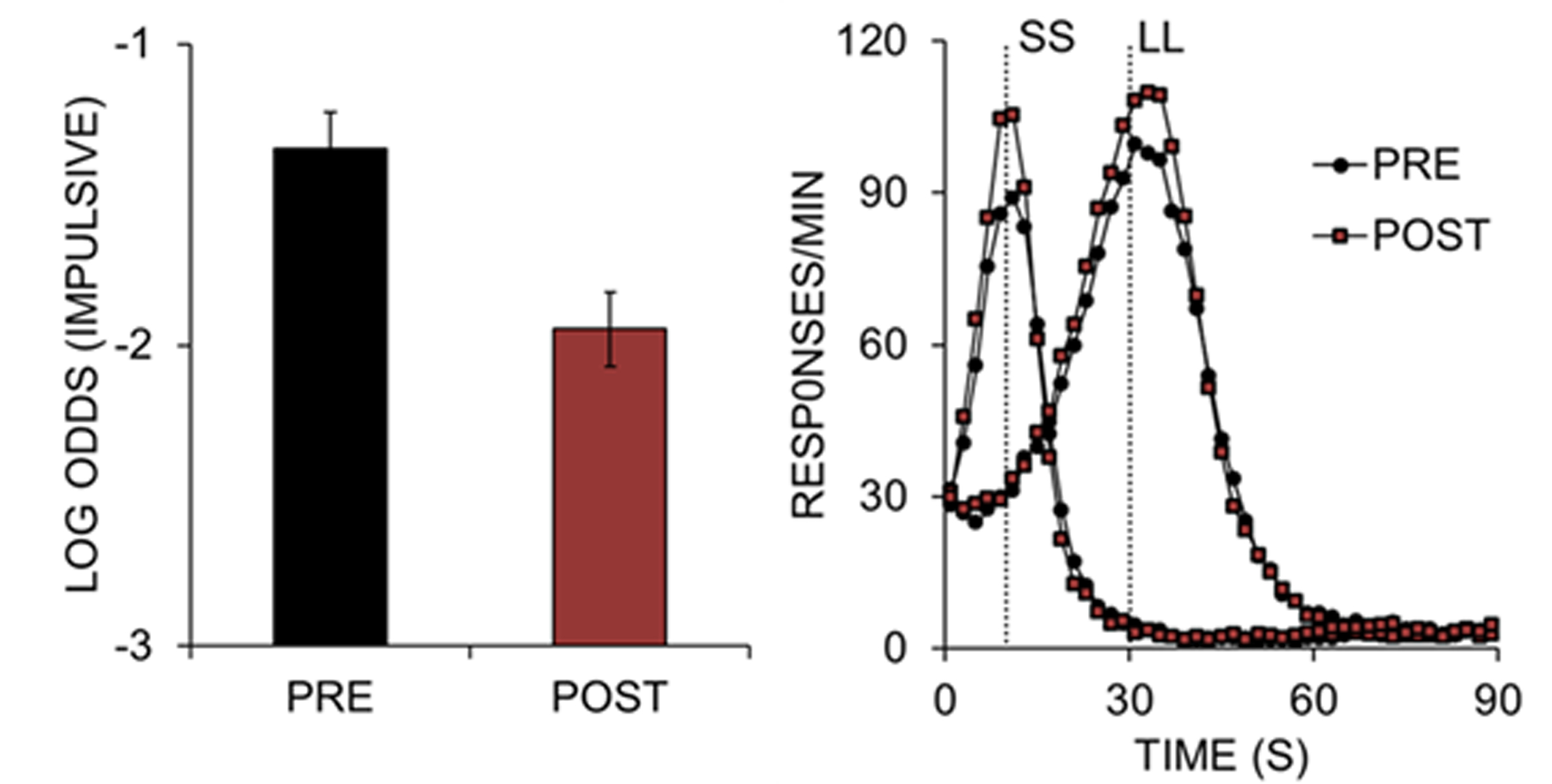Time- and Reward-Based Neurocognitive Interventions
Our laboratory utilizes neurocognitive interventions to reduce impulsive choice. The interventions are developed to address the theoretical processes underlying impulsive choice such as temporal and magnitude judgments. Our lab has found that reward-based interventions, consisting of exposure to varying reward amounts, decreased impulsive choice (Marshall & Kirkpatrick, 2016). It is hypothesized that the intervention improved the rats’ sensitivity to relative reward amounts being offered. We have also found that time-based interventions, exposing rats to delay(s), resulted in fewer impulsive choices. The rats' timing precision improved along with the increases in self-controlled choices, suggesting improved sensitivity to the relative delays involved in the choices (Smith, Marshall, & Kirkpatrick, 2015; Peterson & Kirkpatrick, 2016). Recently, we have expanded upon our time-based interventions by investigating their longevity and generalizability. Our results are promising as the fixed interval intervention was durable for a period of 9-months (about 15 human years) and generalize to a variety of choice tasks (Bailey et al., 2018).
Recently, we compared the effects of a fixed interval (FI) intervention in male and female rats. The intervention successfully improved self-control in a female sample (Stuebing et al., 2018). The results were similar to previous results in male rats, but there were some differences in behavioral patterns as well. To better understand potential sex differences, we directly assessed the intervention efficacy in males and females (Kirkpatrick et al., in prep). Male and female rats received the fixed interval intervention or a control task with no delay to reward and then were tested on an impulsive choice task where the SS delay was manipulated (5 s --> 10 s --> 20 s). The intervention increased the proportion of LL choices made by males and females but was significantly more effective in females at the shorter SS delays.
Our future research is designed to establish whether the neurocognitive interventions operate by improving timing accuracy (i.e., establishing better-informed decision-making) or tolerance to delay (i.e., training the delays to be less aversive). Furthermore, we will determine whether the interventions always result in optimal decision-making or whether they can alter sensitivity to delay and magnitude in a way that results in suboptimal preferences.
| Figure 1. |
 |
Related Publications
Bailey, C., Peterson, J. R., Schnegelsiepen, A., Stuebing, S. L., & Kirkpatrick, K. (2018). Durability and generalizability of time-based intervention effects on impulsive choice in rats. Behavioral Processes, 152, 54-62.
Stuebing, S. L., Marshall, A. T., Triplett, A., & Kirkpatrick, K. (2018). Females in the forefront: time-based intervention effects on impulsive choice and interval timing in female rats. Animal Cognition, DOI: 10.1007/s10071-018-1208-9
Peterson, J. R., & Kirkpatrick, K. (2016). The effects of a time-based intervention on experienced middle-aged rats. Behavioural Processes, 133, 44-51.
Marshall, A. T., & Kirkpatrick, K. (2016). Mechanisms of impulsive choice: III. The role of reward processes. Behavioural Processes.
Smith, A. P., Marshall, A. T., & Kirkpatrick, K. (2015). Mechanisms of impulsive choice: II. Time-based interventions to improve self-control. Behavioural Processes, 112, 29-42.
Related Conference Presentations
Kirkpatrick, K., & Bailey, C. (2018).Moderating sub-optimal choices in delay discounting tasks in rats. Invited symposium contribution at the American Psychological Association, San Francisco, CA.
Panfil, K., Bailey, C., Mains, A., Davis, I., Schnegelsiepen, A., & Kirkpatrick, K. (2018). Sex differences in the efficacy of time-based interventions to promote self-control. Society for the Quantitative Analyses of Behavior, San Diego, CA.
Schnegelsiepen, A., Davis, I., Panfil, K., Bailey, C., Mains, A., & Kirkpatrick, K. (2018). Girls just want to LL: An investigation of a fixed interval intervention effect on impulsive choice between sexes. Kansas Association for Behavior Analysis, Lawrence, KS.
Kirkpatrick, K. (2018). Improving choice and timing processes through time-based interventions. Invited address at the Kansas Association for Behavior Analysis, Lawrence, KS.
Kirkpatrick, K. (2018). The role of timing processes in delay discounting. Invited address at the Texas Association for Behavior Analysis, Houston, TX.
Kirkpatrick, K. (2017). Time-based interventions to promote self-control. Invited talk at the Society for the Quantitative Analyses of Behavior, Denver, CO.
Bailey, C., Schnegelsiepen, A., Stuebing, S., Marshall, A. T., Peterson, J. R., & Kirkpatrick, K. (2017). Testing order and generalizability of intervention effects on impulsive choice in rats. Pavlovian Society, Philadelphia, PA.
Bailey, C., Marshall, A. T., Peterson, J. R., Schnegelsiepen, A., Stuebing, S. L., & Kirkpatrick, K. (2017). Generalizability of a fixed-interval intervention effects on impulsive choice in rats. Society for the Quantitative Analyses of Behavior, Denver, CO.
Binkley, C. M., Stuebing, S. L., Peterson, J. R., Critcher, B., Davis, I. R., Koehn, P., & Kirkpatrick, K. (2017). Fading in and out of time: Interventions to promote self-control. Society for the Quantitative Analyses of Behavior, Denver, CO.
Kirkpatrick, K. (2017). Using interval schedules to promote self-control in rats. Invited talk at the Midwestern Psychological Association, Chicago, IL.
Marshall, A. T., Peterson, J. R., Turpen, C., & Kirkpatrick, K. (2016). The durability and generalizability of neurocognitive intervention effects on impulsive choice in rats. Society for Neuroscience, San Diego, CA.
Peterson, J. R., & Kirkpatrick, K. (2015). A time-based intervention to promote self-control in middle-aged rats. Spring Meeting of the International Conference on Comparative Cognition, Melbourne, FL.
Kirkpatrick, K., & Marshall, A. T. (2015). Mechanisms of impulsive choice: III. The role of reward processes. Invited symposium contribution at the Spring Meeting of the International Conference on Comparative Cognition, Melbourne, FL.
Smith, A., & Kirkpatrick, K. (2013). Delay exposure as a potential mechanism to increase self-control in rats. Fall Meeting of the International Conference on Comparative Cognition, Toronto, Canada.
Galtress, T., Smith, A., & Kirkpatrick, K. (2012). DRL intervention effects on an impulsive choice task. Fall Meeting of the International Conference on Comparative Cognition, New Orleans, LA.
